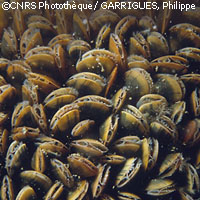Study reveals impact of C02 on shellfish
Ocean acidification resulting from human emissions of carbon dioxide (CO2) is seriously threatening the future of some of the world's most popular edible shellfish - mussels and oysters - according to a study by Dutch and French researchers. It is estimated every day 25 million tonnes of CO2 are absorbed by the sea, making it more acidic. Since the beginning of the industrial age, the ocean pH has declined by 0.1 units, and it is predicted that it will fall by a further 0.4 units by the end of the century. Shellfish rely on steady carbonate ion concentrations in order to produce the calcium carbonate needed to develop their shells. But with acidification comes lower levels of carbonate ions, and previous studies have shown how this imbalance has slowed up the production of calcium carbonate by marine organisms such as coral, seaweed and phytoplankton. Now scientists from the Netherlands Institute of Ecology (NIOO) and the Oceanographic laboratory of the French National Scientific Research Centre (CNRS) have turned their attention to studying the impact of these acidic conditions on mussels and oysters. Their findings, which are to be published in the journal Geophysical Research Letters, suggest that like other shellfish, oysters and mussels, are seriously threatened by the change in the pH balance of the world's seas. Using tanks with controlled sea water, the researchers observed the shellfish as greater amounts of CO2 were added. They found that the mussels' and oysters' ability to produce their shells was reduced by 25% and 10% respectively in seawater which had the CO2 levels expected for the year 2100 - 740 parts per million per volume (ppmv). When CO2 reached 1,800 ppmv, mussel shells completely dissolved. These are worrying findings given the importance of these shellfish for biodiversity and the economy. For the last 30 years, global shellfish production has increased by just under 8% on an annual basis. In 2002, it reached 11.7 million tonnes, corresponding to a commercial value of USD10.5 billion (€7.9 billion). Mussels and oysters also have an important role to play in the environment. They behave as 'ecosystem engineers', governing energy and nutrient flows in coastal waters, and providing habitats to other species. They are also important food sources for birds. The researchers conclude that any decline in these species of shellfish would have major consequences for coastal biodiversity. In order to fully assess the impacts of ocean acidification, the researchers underline the need to further investigate adaptive responses of these organisms to long term CO2 enrichment. These issues are expected to be addressed in a project proposal on ocean acidification, to be submitted under the Seventh Framework Programme (FP7).
Countries
France, Netherlands



